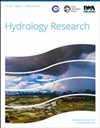Influence of reservoir impoundment on rainfall erosivity in the Three Gorges Reservoir region of China
IF 2.4
4区 环境科学与生态学
Q2 Environmental Science
引用次数: 0
Abstract
New dammed reservoirs are expected to have a significant effect on the regional hydrocycle, but the detailed patterns may not be well understood. Regional climate change is likely to cause soil erosion uncertainty by affecting rainfall erosivity. In the present study, local precipitation and rainfall erosivity were investigated to determine the impounding influence of the Three Gorges Reservoir. Daily erosive precipitation, from 1980 to 2020, was categorized into four intensity levels (light, moderate, heavy, and very heavy), as well as extreme rainfall, to understand their contribution to erosivity. It was found that the impoundment significantly affected local precipitation, with both heavy precipitation and the relative erosivity showing a substantial declining trend (Sen's slope = 2.141, p < 0.05). The Mann–Kendall test indicated an abrupt change point around the year 2002, evidencing the effect of the reservoir impoundment (since 2003). Reservoir impoundment redistributed the intensity levels of erosive precipitation, leading to a 24.3% decrease in the erosivity of heavy precipitation and an 8.2% increase in the moderate category. The unimodal distribution of monthly precipitation was altered to a bimodal distribution with peaks in July and September, resulting in a longer but lower-risky erosion period of high concern. The fluctuations of Rx1day and Rx5day were obviously flattered after impoundment, with a 54.2% peak reduction in relative erosivity on average. Results indicated that heavy rainfall (including extreme rainfall) was reduced, and annual precipitation and erosivity both had a more even seasonal distribution following reservoir impoundment.三峡库区蓄水对降雨侵蚀力的影响
预计新坝水库将对区域水循环产生重大影响,但其详细模式可能尚不清楚。区域气候变化可能通过影响降雨侵蚀力而引起土壤侵蚀的不确定性。为了确定三峡库区的蓄水影响,本文研究了局地降水和降雨侵蚀力。将1980 - 2020年的日侵蚀降水分为轻度、中度、重度和极重度四个强度级别,以及极端降雨,以了解它们对侵蚀力的贡献。结果表明,蓄水对局地降水影响显著,强降水和相对侵蚀力均呈现明显下降趋势(Sen’s slope = 2.141, p < 0.05)。Mann-Kendall试验在2002年前后出现突变点,表明水库蓄水的影响(2003年以来)。水库蓄水对侵蚀性降水强度进行了再分配,导致强降水侵蚀力下降24.3%,中等降水侵蚀力增加8.2%。月降水量单峰分布转变为7月和9月高峰的双峰分布,形成了较长但风险较低的高度关注侵蚀期。蓄水后Rx1day和Rx5day的波动幅度明显减小,相对侵蚀力峰值平均降低54.2%。结果表明:水库蓄水后强降水(包括极端降水)减少,年降水量和侵蚀力的季节分布更加均匀;
本文章由计算机程序翻译,如有差异,请以英文原文为准。
求助全文
约1分钟内获得全文
求助全文
来源期刊

Hydrology Research
Environmental Science-Water Science and Technology
CiteScore
5.30
自引率
7.40%
发文量
70
审稿时长
17 weeks
期刊介绍:
Hydrology Research provides international coverage on all aspects of hydrology in its widest sense, and welcomes the submission of papers from across the subject. While emphasis is placed on studies of the hydrological cycle, the Journal also covers the physics and chemistry of water. Hydrology Research is intended to be a link between basic hydrological research and the practical application of scientific results within the broad field of water management.
 求助内容:
求助内容: 应助结果提醒方式:
应助结果提醒方式:


